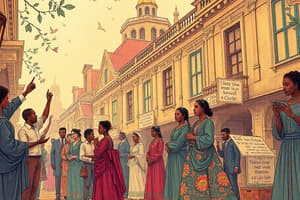Podcast
Questions and Answers
Which historical event inspired other revolutions in Europe and led to the creation of new states and political systems?
Which historical event inspired other revolutions in Europe and led to the creation of new states and political systems?
- The French Revolution (correct)
- The Industrial Revolution
- The Cold War
- The American Revolution
What characterized the Cold War primarily?
What characterized the Cold War primarily?
- Economic cooperation
- Ideological agreements
- Military alliances
- Ideological disagreements (correct)
Which event from the French Revolution symbolized the people's rise against oppressive authorities?
Which event from the French Revolution symbolized the people's rise against oppressive authorities?
- The storming of the Bastille (correct)
- The Reign of Terror
- The rise of Napoleon Bonaparte
- The execution of King Louis XVI
What was a significant outcome of the Industrial Revolution on modern society?
What was a significant outcome of the Industrial Revolution on modern society?
Which event marked the end of the Cold War and ushered in a new era of global cooperation?
Which event marked the end of the Cold War and ushered in a new era of global cooperation?
What lesson do these historical events collectively teach us about human history?
What lesson do these historical events collectively teach us about human history?
Which movement aimed to challenge segregation and discrimination in American society during the mid-20th century?
Which movement aimed to challenge segregation and discrimination in American society during the mid-20th century?
Who were some key figures in the Civil Rights Movement known for advocating non-violent change?
Who were some key figures in the Civil Rights Movement known for advocating non-violent change?
What legislation was passed as a result of the efforts of the Civil Rights Movement?
What legislation was passed as a result of the efforts of the Civil Rights Movement?
Which historical event brought about profound changes in manufacturing, transportation, and communication during the late 18th and early 19th centuries?
Which historical event brought about profound changes in manufacturing, transportation, and communication during the late 18th and early 19th centuries?
What was a significant outcome of the Industrial Revolution related to productivity and wealth?
What was a significant outcome of the Industrial Revolution related to productivity and wealth?
Which era encompassed pivotal moments such as the French Revolution and the Cold War?
Which era encompassed pivotal moments such as the French Revolution and the Cold War?
Study Notes
A Brief Journey through History
Our exploration of human history will delve into pivotal moments that shaped societies and continue to have profound impacts today. Let's embark upon a narrative that encompasses the Civil Rights Movements, Industrial Revolution, French Revolution, and the Cold War.
Civil Rights Movements
The quest for equality and justice for all, particularly for minority groups, is at the heart of the Civil Rights Movement. This era extended from the mid-20th century through the 1960s and challenged the deeply entrenched segregation and discrimination that pervaded American society.
Key figures, such as Martin Luther King Jr., Rosa Parks, and Malcolm X, led the charge for non-violent change and inspired millions around the globe. Their unwavering commitment to equality under the law culminated in the passage of landmark legislation such as the Civil Rights Act of 1964 and the Voting Rights Act of 1965.
Industrial Revolution
Another transformation that altered the world's social, economic, and cultural landscapes was the Industrial Revolution. Initially sparked in Great Britain during the late 18th and early 19th centuries, industrialization brought forth profound changes in manufacturing, transportation, and communication.
The shift from manual labor to mechanization, the rise of factories, and the exploitation of natural resources contributed to increased productivity and wealth. The Industrial Revolution's effects were far-reaching and enduring, shaping the economic structure of modern society.
French Revolution
The French Revolution, which spanned from 1789 to 1799, was an epochal event that demonstrates the potential for individuals to rise against oppressive authorities. The revolution's causes were multifaceted, but the struggle for political, social, and economic equality played a significant role.
Key events such as the storming of the Bastille, the execution of King Louis XVI, and the rise of Napoleon Bonaparte captured the world's attention. The French Revolution inspired other revolutions that swept through Europe and eventually led to the creation of new states and political systems.
Cold War
The Cold War, a period of geopolitical tension and rivalry between the United States and the Soviet Union, lasted from 1947 to 1991. The conflict was primarily characterized by ideological disagreements, military build-ups, and proxy wars.
The Cold War's impacts were felt in every corner of the globe and influenced many facets of modern society. The development of the atomic bomb, the space race, and the proliferation of nuclear weapons are some of the most prominent outcomes of this era.
The Cold War also gave rise to new forms of political and economic systems, including the emergence of communism as an alternative to capitalism. The peaceful resolution of the conflict marked the end of an era and ushered in a new era of global cooperation and interdependence.
These events, when examined individually, reveal profound shifts in human history. However, when examined together, these epochal moments reveal a tapestry that demonstrates the resilience, ingenuity, and resolve of the human spirit. Each event holds lessons for us today and serves as a reminder that history does not simply happen; rather, we all play a part in shaping our collective destiny.
Studying That Suits You
Use AI to generate personalized quizzes and flashcards to suit your learning preferences.
Description
Explore pivotal moments in human history with a journey through the Civil Rights Movements, Industrial Revolution, French Revolution, and the Cold War. Delve into the struggles for equality, industrial transformation, revolutionary uprisings, and geopolitical tensions that shaped societies worldwide.




